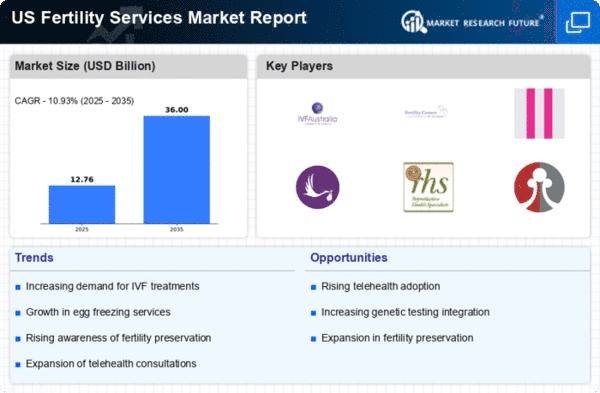Changing Societal Norms
Changing societal norms regarding family planning and childbearing are influencing the fertility services market. As more individuals prioritize career and personal development before starting families, the average age of first-time parents has increased significantly over the past few decades.. This shift often leads to a higher incidence of infertility, prompting a greater need for fertility services. Additionally, acceptance of assisted reproductive technologies has grown, with many viewing these services as viable options rather than last resorts. This evolving perspective is likely to sustain demand for fertility services, indicating a robust market trajectory.
Rising Infertility Rates
The fertility services market is experiencing growth due to rising infertility rates among couples in the US. Factors such as delayed childbearing, lifestyle choices, and environmental influences contribute to this trend. According to the CDC, approximately 12% of women aged 15-44 face difficulties in conceiving, which drives demand for fertility services. As awareness of infertility issues increases, more individuals seek assistance, leading to a greater reliance on reproductive technologies. This trend suggests that the fertility services market will continue to expand as more couples turn to medical interventions to achieve their family planning goals.
Increased Public Awareness
Public awareness regarding fertility issues is on the rise, significantly influencing the fertility services market. Educational campaigns and social media discussions have shed light on infertility, encouraging individuals to seek help sooner. As more people understand the available options, including IVF and egg freezing, the demand for these services is likely to increase. Reports suggest that around 30% of women are now aware of fertility preservation techniques, which could lead to a surge in consultations and treatments. This heightened awareness is expected to drive growth in the fertility services market.
Insurance Coverage Expansion
The fertility services market is positively impacted by the expansion of insurance coverage for fertility treatments. Many states in the US have enacted laws requiring insurance companies to provide coverage for infertility diagnosis and treatment. This legislative support has made fertility services more accessible to a broader demographic, potentially increasing the market size. As of 2025, approximately 15 states mandate some level of fertility treatment coverage, which encourages couples to pursue necessary medical interventions without the burden of high out-of-pocket costs. This trend indicates a growing recognition of fertility services as essential healthcare.
Advancements in Reproductive Technology
The fertility services market is benefiting from advancements in reproductive technology, which enhance treatment success rates. Innovations such as preimplantation genetic testing (PGT) and improved cryopreservation techniques have revolutionized the field. These technologies not only increase the likelihood of successful pregnancies but also provide patients with more options tailored to their specific needs. As success rates improve, more couples are likely to consider fertility treatments, thereby expanding the market. The ongoing research and development in this area suggest a promising future for the fertility services market.
















